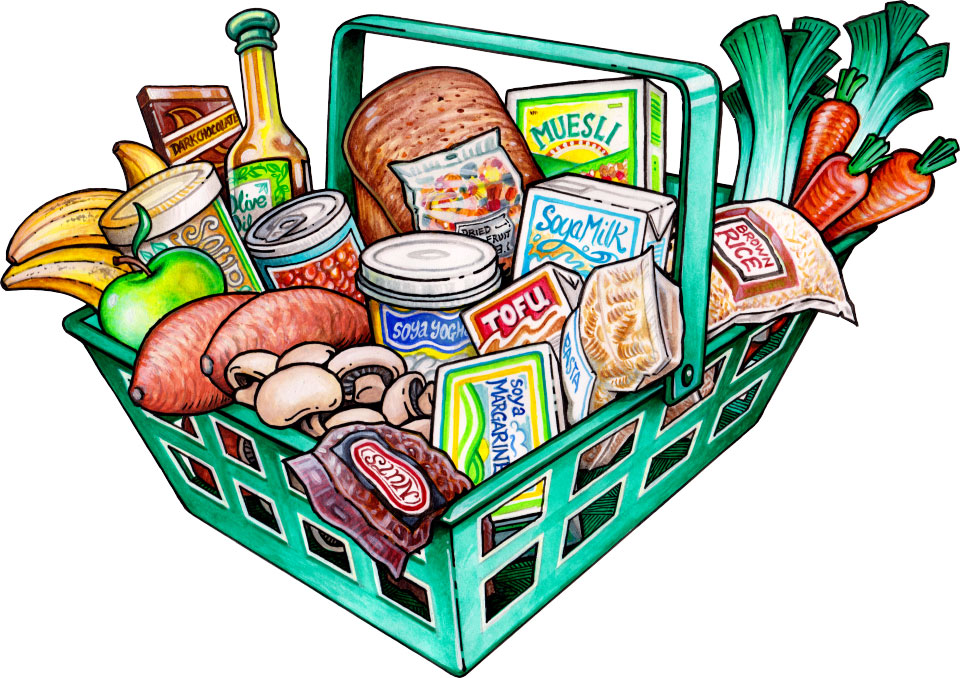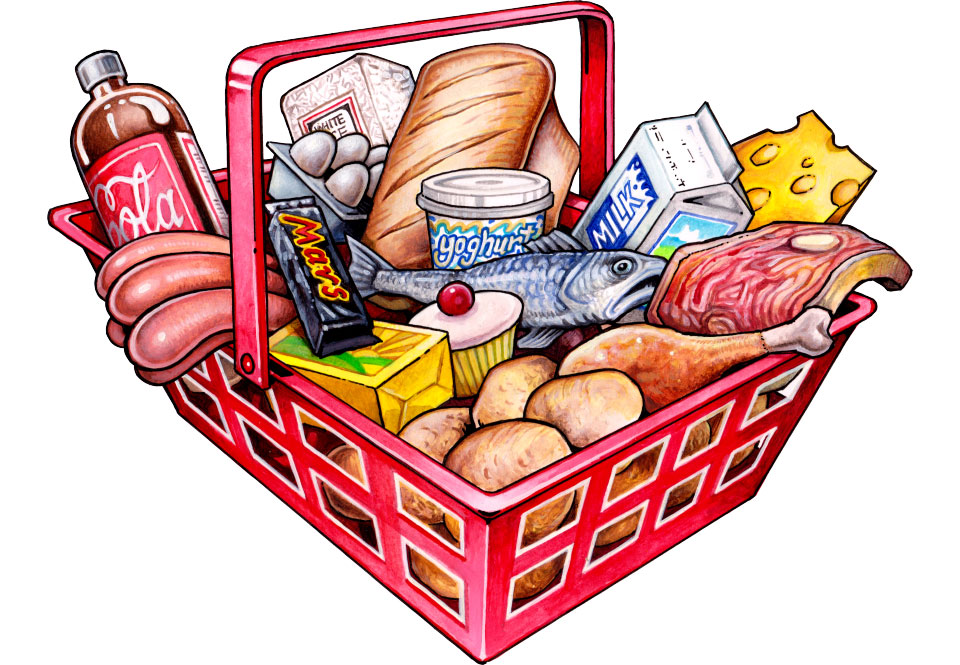Diabetes shopping basket
To help you make smart shopping decisions, we’ve created these interactive shopping baskets. See what’s in the good and bad shopping basket – click on any item in the baskets to learn why it’s good or bad for you and how to replace the items from the bad basket with healthier ones!
These baskets follow the principles of our D-Diet, aimed mostly at type 2 diabetics, but it can significantly improve the health of type 1 diabetics too.
Good foods
Click the items in the basket below for descriptions.

Fruit
Bursting with protective antioxidants and vitamins and full of fibre. Most fruits have a low GI – the sugars they contain are digested and released slowly into the bloodstream – ideal for diabetics! Only be careful with dates, watermelon, figs and raisins.
Vegetables
Rich in fibre, vitamins and minerals. Most dark green (leafy) vegetables are sources of calcium, iron, magnesium and potassium. All vegetables (apart from pumpkin) also have a low GI – the sugars they contain are digested and released slowly into the bloodstream helping to stabilise the blood sugar levels!
Pulses
Beans, lentils, chickpeas or soya – all of them are good sources of protein, contain healthy fibre and minerals such as calcium, iron and zinc. All have a low GI – they release their energy slowly which helps to control blood sugar better. Use them in soups, stews, roasts or blend them and make your own dips, patés, hummus or try falafel (chickpeas-based dish) but make sure the fat content is kept low.
Wholemeal or rye bread
Rye bread has the lowest GI of all types of bread because the sugars from it are released more slowly during digestion. Other wholemeal breads are also good as long as they are made from wholegrains – ie not white with added seeds. Wholegrains are a good source of healthy carbohydrates (sugars), fibre, some B vitamins and magnesium.
Pasta
Whole grain pasta is another good source of healthy carbohydrates (sugars). It has, maybe surprisingly, low GI and is digested more slowly than bread for example.
Muesli and oats
Muesli and oats (jumbo oats, not porridge oats as those are digested more quickly) are an excellent breakfast choice – full of healthy carbohydrates, fibre, some vitamins and minerals. With its slow releasing sugars, this kind of breakfast will give you enough energy for several hours. Top tip: add a tablespoon of ground flaxseed to your cereal – by doing so you’ll get your daily dose of healthy omega-3 fats!
Brown rice
A very good source of healthy carbohydrates, fibre, some B vitamins and minerals such as magnesium, phosphorus and manganese. Brown rice has low to medium GI, which is ideal for keeping your blood sugar in check.
Vegetable oils (eg olive, rapeseed, flaxseed, walnut, hemp)
You need to include healthy fats in your diet – although moderation is the key – and plant oils are the best choice. To make sure you are getting enough of essential omega-3 fats, use rapeseed oil for cooking and flaxseed, hemp or walnut oil for cold preparation (eg salads).
Non-dairy milk (eg soya, oat, rice, almond)
Non-dairy milks are an excellent replacement of dairy milk and offer many advantages – they are free from cholesterol, contain healthy unsaturated fats, protein, some vitamins and minerals and are often enriched with vitamin B12 (an essential vitamin that we need to eat either in enriched foods or take as a supplement) and vitamin D.
Tofu and mock meats
Tofu is made from soya beans and is naturally high in protein and low in fat. It is very versatile and you can use it in both savoury and sweet dishes. Other soya or mock meat products (sausages, burgers, chicken-style pieces, mince, fishcakes etc) are also good sources of protein and contain no cholesterol but don’t rely on them too much and always check their fat content – it can vary a lot!
Nuts and seeds
A source of healthy fats, vitamin E and B group vitamins, minerals (calcium, magnesium, potassium, phosphorus, selenium etc) and fibre. A tablespoon of nuts or seeds makes a good snack – you can enjoy them with fresh or dried fruits, soya yoghurt or on their own.
Soya yoghurt
A delicious yoghurt naturally low in fat. Soya yoghurts also have a low GI, which means they won’t make your blood sugar peak and subsequently get too low. Enjoy as a snack or use the plain variety in salad dressings or add to soups instead of crème fraiche just before serving.
Dried fruit
Ideal for snacking – dried apricots, apples and prunes are all high in fibre and have a low GI. Many dried fruits are also good sources of iron (apricots, prunes, figs). Use dried fruit also instead of sugar or sweeteners in baking – eg a cake made with dried fruit, wholemeal flour and minimum of oil is perfectly suitable even for diabetics!
Soup
For example tomato or lentil soup. They tend to be low in fat and quite filling – a good way to up your vegetable and pulses intake! Check the fat content (shouldn’t be more than 3g per serving) and avoid those that contain dairy. You can always upgrade for example a tomato soup by adding half a can of beans, lentils or chickpeas.
Mushrooms
Contain protein, fibre and are also a source of some vitamins from the B group, vitamin C and several minerals.
Dark chocolate (a square or two of dark chocolate as a dessert or chocolate shavings on a fruit dessert)
Choose higher cocoa content and dairy-free – you’ll benefit from the high antioxidant content and rich taste and avoid too much sugar and saturated fat!
Sweet potatoes
Maybe surprisingly, sweet potatoes are actually much better from the health point of view than common potatoes – they contain a significant amount of fibre which means they are digested more slowly and don’t make the blood sugar levels rise too high. They are also rich in antioxidants, vitamin A and some other vitamins and minerals.
Margarine
Choose varieties that do NOT contain hydrogenated or trans-fats. Good margarines are a good source of healthy fats and are also often enriched with vitamins B12 and D.
Bad foods
Click the items in the basket below for descriptions and alternatives.

Read meat
High in saturated (bad) fats and cholesterol, contains a wealth of cancer-causing compounds but no healthy carbohydrates or fibre. Animal protein also takes longer to digest, makes your kidneys work hard and can cause constipation.
Replace with
Pulses (lentils, beans, chickpeas, soya), mock meats such as veggie mince
Processed meat products
Almost always exceptionally high in saturated fats, often contain bulking ingredients such as flour and slaughter by-products (skin, ears etc) and inevitably also contain cancer-causing agents.
Replace with
Veggie sausages, bean burgers etc
White meat
White meat is far from being a low-fat healthy choice! Almost a pint of fat in a chicken, generous portion of cholesterol and substances increasing your chances of developing cancer make it anything but healthy.
Replace with
Chicken-style pieces (from health food shops), other mock meats, pulses, mushrooms
Fish and seafood
Loaded with residues of toxic substances such as pesticides, heavy metals, industrial waste etc, saturated fats and cholesterol, neither fish nor seafood are a good choice.
Replace with
Plant sources of omega-3 fats are far better – use flaxseed, walnut or hempseed oil (or sprinkle a tablespoon of the ground seeds and/or walnuts on your cereal, add to soups or pasta dishes) or use good quality rapeseed oil for cooking. And when it comes to taste – try fishless fingers (eg VBites or Quorn) or sushi with avocado, peppers or radishes, it’s delicious and contains no nasties.
Milk and cream
Dairy products contain a cocktail of over 35 different natural hormones and they trigger the production of IGF-1 in the body which is directly linked to cancer. Also, the fat in milk is mostly saturated – the very type that contributes to clogged arteries!
Replace with
Soya, oat, rice, hemp or almond milk; no need to be worried about calcium, you can get enough of it from nuts and seeds, pulses, green leafy veg and enriched plant milks. Apart from dairy milk alternatives, you can also get soya or oat cream but careful – it’s higher in fat!
Butter and animal fats
Very high in saturated (bad) fats and cholesterol – our bodies have absolutely no need for these!
Replace with
Margarine, vegetable oils
Cheese
Apart from being high in saturated fats, salt and animal protein (making it very difficult for the body to digest) it also contains hormones and substances called casomorphins making you addicted to it!
Replace with
Vegan cheese such as Cheezly, Violife, No Moo, supermarket own brands or sprinkle nutritional yeast on dishes for an added cheesy flavour.
Yoghurt
Besides containing saturated fats, dairy yoghurts (low-fat or not) also contain a lot of milk sugar – lactose – and other added sugars.
Replace with
Soya yoghurts – they come in a plenty of delicious flavours or plain and contain no cholesterol – in fact soya can help you lower it.
Eggs
A single egg contains as much as the maximum daily amount of cholesterol! Eggs have been linked not just to diabetes but also to some types of cancer, food poisoning and heart disease.
Replace with
Scrambled eggs: scrambled tofu is perfect! See our www.veganrecipeclub.org.uk for a recipe.
Baking: replace an egg by a tablespoon of oil and add baking powder; use mashed banana; apple puree; 2 tablespoons of ground flaxseed; aquafaba or mashed potato. Very often, you can simply skip the egg and the recipe will work out just fine! For more details click on the link above.
Sweets
Cakes, muffins, biscuits, sweets etc tend to be high in fat and sugar and low in good nutrients.
Replace with
Dried fruit, a small portion of muesli, crispbread with fruit spread (no added sugar), oatcakes, fruitcake made with wholemeal flour, dried fruit (instead of sugar) and minimum of oil.
Milk chocolate and chocolate bars
Milk or butterfat are mostly saturated (bad) fats and a very high sugar content is only adding to the highly fattening properties of these foods!
Replace with
Fresh or dried fruit, nuts and seeds, a square or two of dark chocolate, natural snacks made of ground nuts and fruits etc.
Potatoes
High carbohydrate content and not enough fibre gives potatoes a high GI (which means they are digested quickly, making your blood sugar spike).
Replace with
Sweet potatoes, root vegetables
White rice
Stripped of most of its goodness, white rice is basically just carbohydrates that the body digests quickly and your blood sugar levels will peak.
Replace with
Brown rice – with fibre and some vitamins and minerals it is much more nutritious and is digested slowly.
Sweetened drinks
A lot of sugars or artificial sweeteners won’t do your body any good. Diet or sugar-free drinks are not a solution because sweeteners have been linked to metabolic problems and their consumption won’t help you form healthy habits..
Replace with
Water with fresh fruit juice, smoothies, tea
White bread
White flour is essentially only made up of sugars so definitely not a good choice!
Replace with
Rye bread, wholemeal pitta bread, pumpernickel rye bread, crostini (eg Pogen brand) or crispbread (eg Ryvita)





